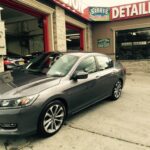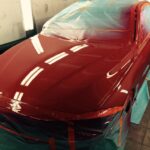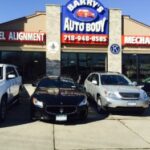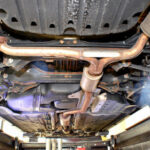Preguntas frecuentes
Frequently Asked Auto Body Questions
You have a right to request that your car is towed to an auto body shop of your choosing. If a tow truck driver refuses to tow you where you want to go, you can report the driver. Often times tow truck drivers have private arrangements with auto body repair shops to bring them customers. It is illegal for a tow truck driver to refuse to bring your car to the auto body shop of your choice so it is important that you know where you want your car towed and relay that information to the tow truck driver.
Vehicle owners have many rights when under New York State Insurance Law, chief among them is the right to choose which auto body shop they want to use to repair automobile damages.
Insured’s also have the right to request an independent appraisal to establish the cost of repairs; the right to retain the vehicle until their claim is settled in the case of a vehicle being deemed totaled and the right to post repair inspections.
IT’S IMPORTANT TO KNOW YOUR RIGHTS WHEN DEALING WITH INSURANCE COMPANIES!
Insurance companies want to pay as little on claims as possible which is why they enter into agreements called DRP’s with auto body shops. If you did not choose to have your vehicle repaired at a DRP shop, your insurance company may try to “steer” you to one of their DRP shops. If you refuse to have your car towed to a DRP shop they will do whatever they can to “steer” you to the shop of your choosing. This is called steering and it is ABSOLUTELY ILLEGAL IN NEW YORK!
Regulation 64 of the New York State Insurance Law, specifically Section 2610, states that, “An insurance company cannot require that repairs be made to a motor vehicle in a particular place or repair shop. You have a right to have your vehicle repaired in the shop of your choice.”
If your insurance company tries to steer you to one of their DRP shops you can report them to the proper authorities.
A Direct Repair Program (DRP) is an agreement between an insurance company and certain auto body shops of their choosing whereby they work together to reduce the cost of repairs in exchange for having the customer steered toward their shop. These shops can also be called, “Select Service” “Preferred” or “Recommended” shops. While reducing repair costs might sound good, the truth is that it does not benefit you, the insured, but instead is a way for insurance companies to reduce repair costs so they can maximize their profit.
Think about it – you pay your insurance premiums to give you peace of mind that your car will be repaired properly in case of an accident. When insurance companies work out a deal to reduce the price of an automotive repair they don’t do it to help the insured by passing savings on to you. On the contrary, shops who are enrolled in the Direct Repair Program pay out claims at a far lesser rate than the insured is due to receive from the insurance company.
Insurance companies grade DRP shops on how quickly and cheaply they can make the repair which often results in the repair being done incorrectly or with after-market parts which can compromise vehicle performance and your safety. Safe and proper repairs should be the primary motivation for all shops and insurance companies should not be providing incentives to cut corners. The Direct Repair Program benefits the insurance companies and the auto body repair shop – the only one who doesn’t benefit is the YOU – THE INSURED!
When a vehicle is totaled it means that the cost of repairs exceeds the value of the vehicle. If your vehicle is deemed “totaled” by the auto body shop and agreed to by the insurance company it is very important that you DO NOT ALLOW THE INSURANCE COMPANY TO TAKE POSSESSION OF THE VEHICLE UNTIL THEY HAVE SETTLED YOUR CLAIM! REMEMBER – THE INSURANCE COMPANY DOES NOT
Insurance companies don’t like paying claims so they do everything in their power to pay the insured as little as possible. Often times that includes dragging out the negotiations until the insured settles out of frustration, necessity or both.
The best way to ensure that your claim is settled promptly is to refuse to release your vehicle from the auto body shop until the claim is settled. The reason for this is simple – the auto body shop charges a daily storage fee. Those fees add up quickly so insurance companies avoid them by having the vehicle towed to their own lot. Once they take possession of your vehicle, they have the upper hand and can drag out negotiations over your claim until you agree to THEIR price. Protect yourself against these tactics by simply refusing to release the vehicle from your chosen auto body repair shop until your claim is settled. Having to pay a storage fee will motivate them to settle more quickly.
WORK FOR YOU!
- Start your search on the internet. Find out if the shop belongs to any business organizations or is an active member of the community. Those shop owners who are involved in the community care more about their reputation so they will work hard for you.
- Make sure the auto body shop is a member in good standing with your state’s Motor Vehicle Collision Repair Board
- Find out if the shop offers a warranty for their work. Quality shops will offer long term warranty’s on their work.
- Make sure your auto body shop uses only NEW PARTS AND EQUIPMENT PURCHASED FROM THE AUTOMOBLILE MANUFACTURER. If a shop uses after market , junked or scrapped parts they cannot warranty their work or guarantee your safety when driving down the highway at 50 or more miles per hour. Don’t risk your life driving a car with junked parts installed.
- Ask if the shop is registered as a Direct Repair Program shop for the insurance companies. If they are you may want to find another shop that works for YOU instead of the insurance company.
- Tour the shop to make sure it is clean and that all the bays are operational. Ask to see examples of their body work and to provide references if they are not registered with the local Chamber of Commerce or Better Business Bureau.
- Ask friends and co-workers which auto body repair shop they have had good experiences with. A quality auto body repair shop will gain many of their customers through word of mouth.
- DO NOT ASK YOUR INSURANCE COMPANY TO RECOMMEND AN AUTO BODY REPAIR SHOP. Insurance companies want you to use their auto body repair shops so they can save money. INSURANCE COMPANIES AND THE SHOPS THEY RECOMMEND DO NOT WORK FOR THE INSURED.
- Compare prices and be wary of shops who charge significantly less than other shops. If an auto body repair shop is using only new parts and equipment purchased from the manufacturer their prices will be approximately the same. Any shop whose pricing is significantly lower has to be cutting corners on the repair in order to make money.
- Ask the shop if they can help you with insurance claims in the event that you need one. A quality shop will have people on staff to help you navigate the insurance claims process.
If your vehicle is damaged in an accident or totaled completely and you and the insurance company cannot agree on a settlement, you have the right to hire an independent appraiser. You can find a “right of appraisal” clause in your insurance policy. Don’t be afraid to use it.
How it works – You hire an independent appraiser who submits his/her appraisal to insurance company. If they cannot come to an agreement a third party is chosen to evaluate the two estimates or to submit his/her own. When a value is agreed on by two of the three submitted, that value is binding and final.
YOU HAVE A RIGHT TO DISPUTE YOUR INSURANCE COMPANY’S OFFER ON A TOTAL LOSS AND ON A REPAIR.
Aftermarket parts are replacement parts made by other than the manufacturer. Installing aftermarket (or counterfeit) parts will void your vehicle’s manufacturer’s warranty which will decrease your vehicle’s value and can negatively affect your car’s performance. David Zuby, Chief Research Officer for the Insurance Institute for Highway Safety, cautions drivers about using aftermarket parts saying, “you can’t willy-nilly change those parts because the system may not work the way it was designed.”









